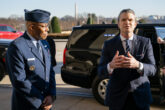February 24, 2017
McMaster knows how national security policy can go wrong. Will that help him?
For a generation after losing the Vietnam War, the American military soothed itself with a “stabbed in the back” narrative: If not for meddling politicians, intrusive journalists and a spineless public, the military would have won the war. In his book, “Dereliction of Duty,” H.R. McMaster (then a young Army major) demolished this palliative myth, carefully using historical evidence to show how military leaders failed their troops and their country by remaining silent — or worse — during the escalation in Southeast Asia. Along with other volumes focused on the conduct of the war, McMaster’s work helped reallocate blamefor America’s failures in Vietnam to those in uniform who deserved their share of culpability.
In the book, McMaster carefully avoided many of the larger questions raised by his scholarship, such as whether military dissent might have altered the course of the Vietnam War — both as a matter of good historical tradecraft and career savvy. This past week, McMaster, now a three-star general and bona fide hero of the first and second wars in Iraq, was tapped by President Trump to be national security adviser. The big questions he didn’t take on in print 20 years ago now loom large for him and the White House: Can an insular and politicized team make effective national security policy? Should military officers speak up when they see policy going off track? Would it make a difference if they did? And how should civilian officials encourage dissent from the Pentagon?
“Dereliction of Duty” painstakingly dissects four major decisions between 1963 and 1965 that led the United States deeper into Vietnam. McMaster shows how military chiefs failed repeatedly to raise dissenting views about escalation, unable to penetrate the inner sanctums of the White House and meaningfully change the course of the war. In one anecdote, McMaster describes how Army Gen. Earle Wheeler told his staff that he planned to object to President Lyndon B. Johnson’s decision in 1965 to send more troops to Vietnam without calling up additional reservists. But when asked directly by Johnson whether he agreed with the move, Wheeler silently nodded and indicated his assent. Dereliction of duty, indeed.
Read the full article at The Washington Post.
More from CNAS
-
National Security Has a Human Capital Problem and There’s No Fast Way Out
National security doesn’t really exist without the military forces and supporting civilians to carry it out. Recruitment remains a problem for the armed forces. And there’s a ...
By Katherine L. Kuzminski
-
The Department of Defense’s Breakthrough Nuclear Moment Risks Slipping Away
Unless they act, the Department of Defense’s breakthrough nuclear moment may vanish before it really happens....
By Will Rogers
-
Sharper: National Security Human Capital
U.S. national security depends on the nation’s ability to leverage the expertise of uniformed warfighters and the highly skilled civilian professionals who develop and impleme...
By Charles Horn & Taren Sylvester
-
Hegseth Brings the Culture War to Combat
The fundamental challenge of military leadership lies in creating cohesive teams that can work together in an environment of mortal risk and, when called upon to do so, use le...
By Dr. Jason Dempsey




